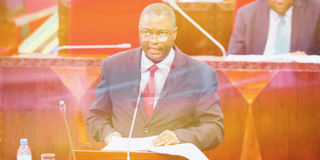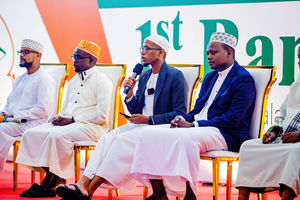Tanzania Government studying ruling with Elections.

The Attorney General Prof Adelardus Kilangi
What you need to know:
- The government is looking at the possibility of appeal the ruling issued by the High Court that municipal, town, and District Executive Directors (DEDs) are not allowed to supervise local government elections on behalf of the National Electoral Commission (NEC).
Dar es Salaam. The government is studying the ruling by the High Court that declared unconstitutional electoral laws that give municipal, town and district executive directors (DEDs) powers to supervise elections on behalf of the National Electoral Commission (NEC) before deciding what to do next.
The court said sections 7 (1) and 7 (3) which empower DEDs to supervise and coordinate registration of voters for presidential, parliamentary and council elections were against the constitution.
The petition was filed last year by Mr Bob Wangwe, who is a Chadema member, against the Attorney General (AG). Mr Wangwe was represented by advocate of the High Court, Ms Fatma Karume.
Speaking yesterday to The Citizen, the Attorney General Prof Adelardus Kilangi said the government was still looking into the details of the judgment before deciding whether to appeal the ruling or not.
“We are now discussing and then will see what to do. The issue of appeal is our right… but we are still talking,” he said.
On Friday, at the High Court, Lady Justice Atuganile Ngala said the sections contradict section 74 (14) of the constitution for not setting limitations to ensure the independence and accountability of DEDs who double as returning officers during polls.
When asked whether there would be an impact on the matter, Prof Kilangi responded only by saying that they will issue a statement after they study the ruling and come up with a way forward.
Speaking in a separate interview yesterday political analysts, politicians and human right activists said the court decision was a breakthrough that paved the way for a democratic reformation.
A political analyst from the University of Dar es Salaam (UDSM), Dr Richard Mbunda, said that the decision was a positive step towards creating level grounds during elections, adding NEC should now use its own people who are neutral for the benefit of both sides. “Some DEDs were those who were contesting in various political positions and failed but later they were appointed as directors, so it’s hard for them to be impartial,” he argued.
Legal and Human Rights Centre (LHRC) which followed the petition with interest said the ruling was just the beginning, adding that they were now considering filing another constitutional case.
LHRC executive director Anna Henga said the decision was a good start because all the sections that were against the constitutional were deleted. “We’re still thinking of opening another constitutional case for a more independent electoral commission or a constitutional process to be reinstated so that there is a more independent commission,” she said.
Describing the basis of the original case, Ms Henga said it was a continuation of the democratic struggle and civil rights they fight for. For his part, political analyst Prof Gaudence Mpangala from Ruaha University College (Ruco) said the court decision was 100 per cent correct because it has been a long cry for people demanding a free and independent commission.
“This is a good start to demanding democracy in the country as people did not have faith with those DEDs because they are appointed by the president,” he said.
Chadema’s Protocol, Communications and Foreign Affairs director John Mrema said the decision would empower returning officers as they would be free and won’t fear losing their jobs for announcing the real results of an election.
“There are some issues which were done against the constitution, including transfer of DEDs because they announced results that did not please dome quarters, hence this ruling will be useful,” he said.




